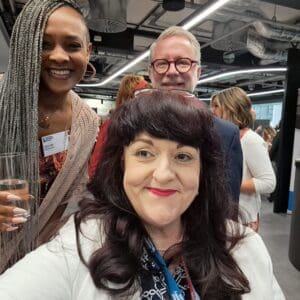Where we work

By Rebecca Elliott, Disability Business Partner at Business Disability Forum.
It’s no secret that I’m passionate about working from home.
I work full time from my home office, but the other week I travelled 100 miles to the BDF conference in London.

The first session of the day gripped me because of the topic – “Where we work?”
Bela Gor and Emily Jackson joined Asset Manager, Vasiliki Arvantit from Derwent plc on a panel discussion to debate today’s working world, and how we can take into account everyone’s different needs.
Bela shared that she prefers working from home, with its improved mental health benefits and more time to eat a better diet. On the other hand, Emily was passionate about working in the office four days a week because she loves the structured separation of work from her home life; she also highlighted the physical and mental health benefits of her daily commute – 7000 steps (to travel to the office) versus just 7 (when working from home). However, Emily also mentioned some of the disabled contacts she works with who find office working less productive, due to the impact of barriers like noise, or the challenges of commuting. Vasiliki preferred the office environment for her mental health and really didn’t enjoy the confines of her working world while working from home during the COVID years.
During the session, an audience delegate poll found 61 per cent stating they prefer hybrid working, with the majority of time at home; only 20 per cent said they preferred home working with most of their time spent in the office.
I was one of the 61 per cent.
I am disabled. I was born with a condition called Ehlers Danlos syndrome which meant I had no hip socket and all my joints are arthritic and unstable. This causes chronic pain that always gets worse as the day goes on. Most mornings it’s not easy, no matter how small the commute in terms of steps.
And yet once I’m seated in my comfortable ergonomic chair, heat pads on my spine and able to lie back in between meetings, I can work a day filled with Teams calls to BDF members, talking about disability inclusion and how to make workplace adjustments for their employees.
When we speak about where we work, we need to remember that not everyone has a choice; some people want to work but can’t; some people want to work less because of their disability; some people could work but only if the right adjustment was made to remove the barriers that they face. To some extent, there is no adjustment that can remove the main barrier for me – how to manage my chronic pain. However, the myriad of coping mechanisms I have set up at home enable me to function and to work successfully, through the technology which became so common during COVID.
I have no doubt that’s without COVID forcing all of us to retreat inside our homes, we would not be talking about where we work today. This would not be a subject for discussion because where we work would automatically be in the office, on a site, or travelling in between for meetings.
And none of those would be achievable for me. If COVID hadn’t happened and the work from home mandate had never come, I would be unemployed.
In a complex area, the return to office mandate sees firms pushing for office return for collaboration benefits and ‘learning by osmosis’ and while I recognise the power of ‘learning by osmosis’, I think we need to understand that the way this takes place through collaboration has fundamentally shifted.
For me, the thought of going back to a world that finds it unacceptable for all of us who have experienced working from home to try to imagine that never existed seems unimaginable. We cannot unlearn what we have learned about new ways to work. We cannot un-feel what we have felt and if that has been the joy of being able to return to the (virtual) workplace after so long away, is it right that we remove an ability to work from home?
No doubt this debate will rumble on until we find a happy consensus but I think learning from what have experienced and taking the best of those approaches forward enables us to include the most people in a productive workplace and isn’t that what we all want?
View Annual Conference 2024 highlights
View Annual Conference 2024 session recordings (In our Knowledge Hub. For Members and Partners only)